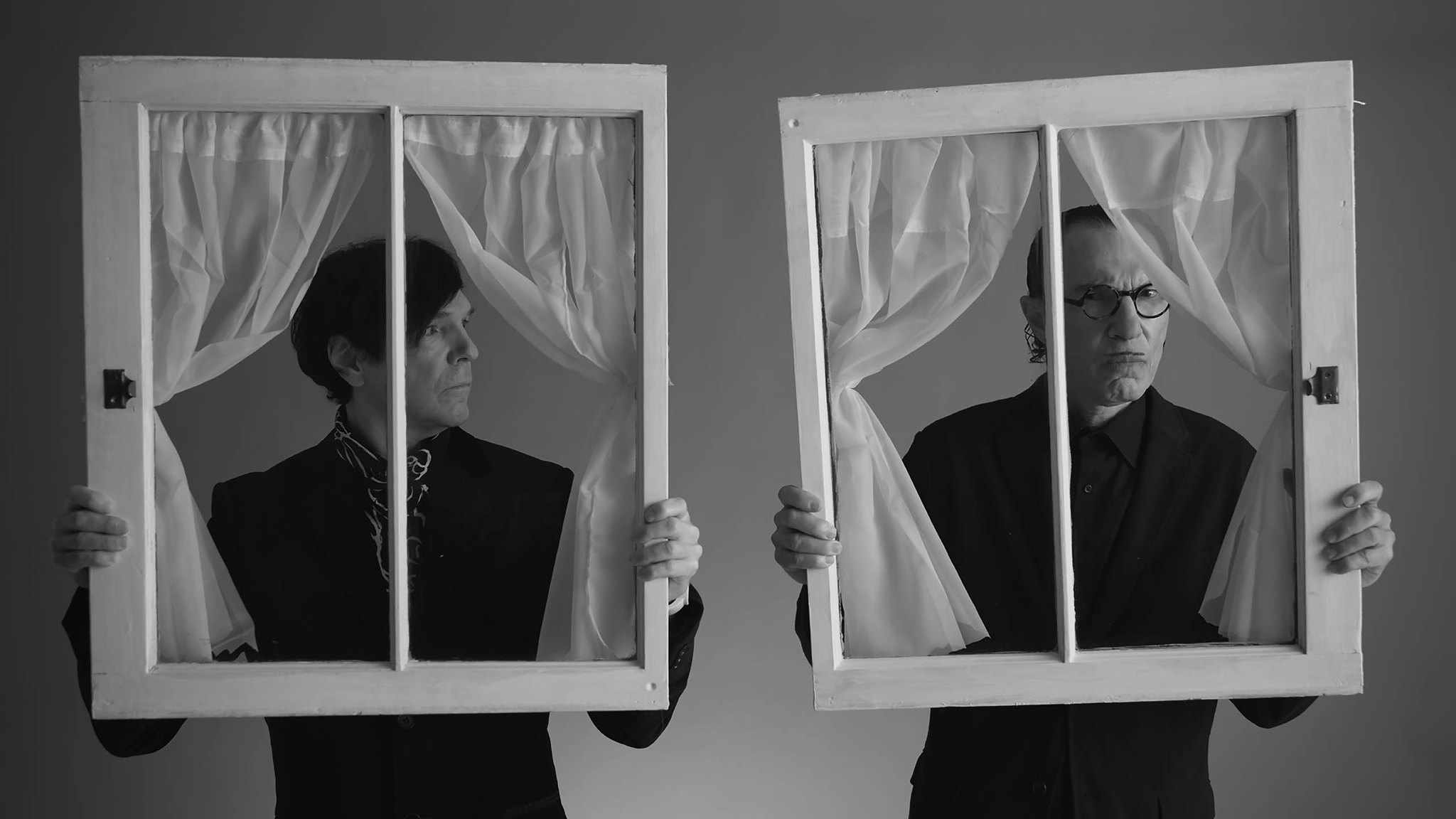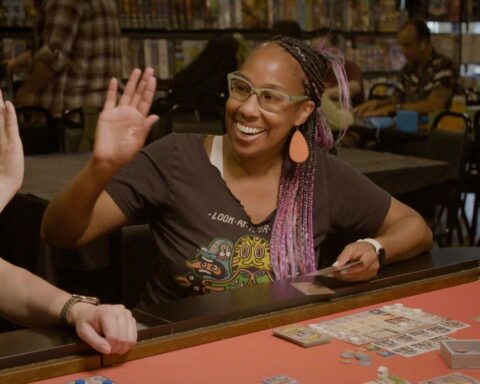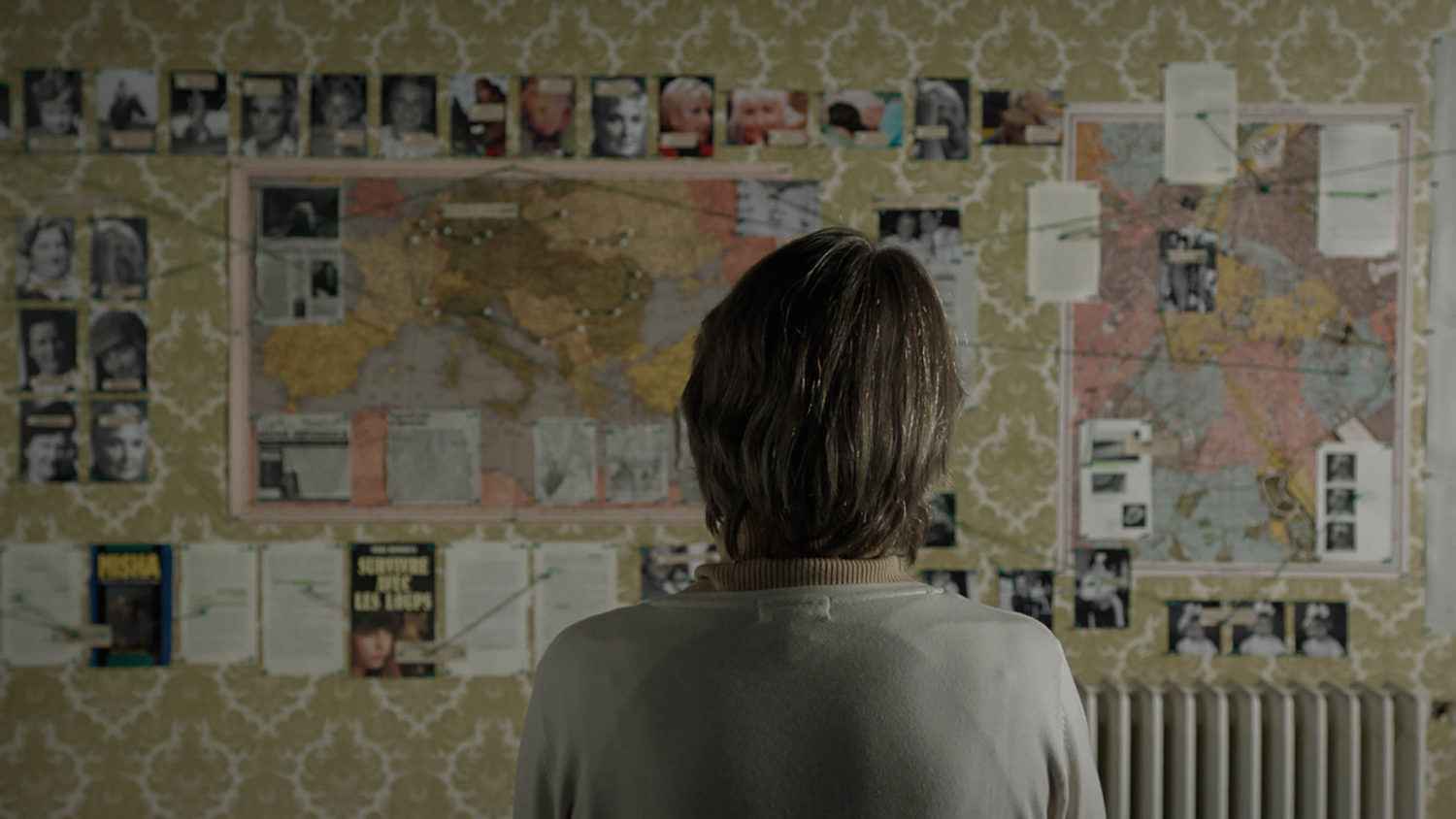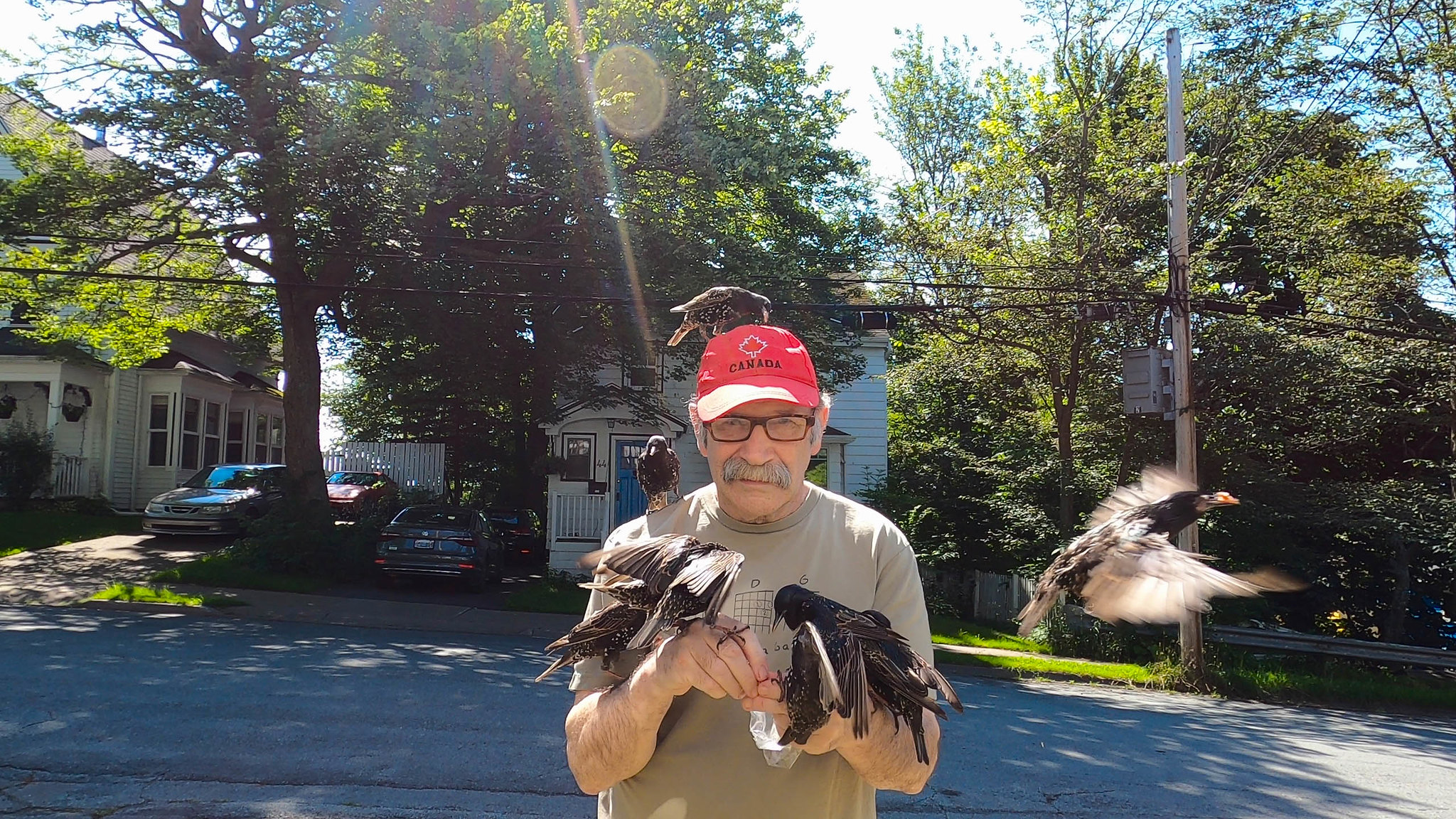For decades, English director Edgar Wright has been making quirky, kinetic television shows and cinema. From Spaced to the Cornetto Trilogy of Shaun of the Dead, Hot Fuzz and World’s End through to Baby Driver and his upcoming Last Night in Soho, Wright’s films are often highly stylized and deeply infused with music.
Ron and Russel Mael began making music in the late 1960s, forming the band Halfnelson and then eventually changing the name to Sparks. For over five decades, they’ve had minor hits and major influences on innumerable bands, finding their greatest success over in Britain or on local Los Angeles radio.
With The Sparks Brothers, Wright’s first foray in to non-fiction filmmaking, the director has crafted a lengthy yet loving portrait of the duo. Told through numerous clips and dozens of interviews from the likes of Beck, Todd Rundgren, “Weird Al” Yankovic and members of Duran Duran, the story of the Maels siblings is an antidote to the field of maudlin or depressing rock docs. This is a tale of tenacity. The brothers consistently changed their look and style while never fully fitting in with contemporary trends. Sparks was a pop band that was sporadically popular, yet fuelled by its incessant drive to push music forward in different directions no matter what had succeeded in the past.
The result is a film that’s somewhat overwhelming yet undeniably joyous. The Sparks Brothers is a true fan’s love letter to a group that he adores and feels (rightly) that the world should get on board. For fans who have long been denied such intimate looks at what makes the Maels brothers tick, they’re treated with more than they could have hoped for in what’s surely a definitive documentation of this band and their legacy.
POV spoke to Edgar Wright prior to The Sparks Brothers’ virtual premiere at Sundance 2021
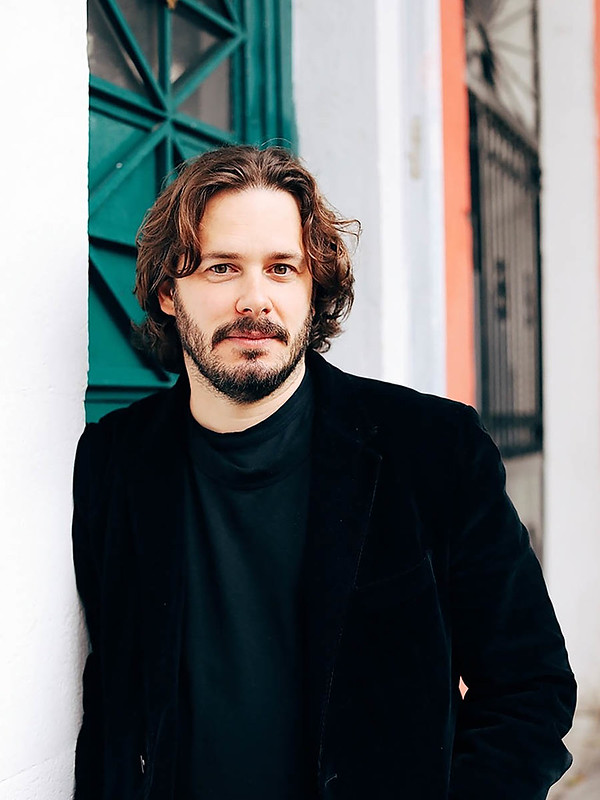
POV: Jason Gorber
EW: Edgar Wright
This interview has been edited for brevity and clarity.
POV: How hard was it to be a self-admitted fanboy while attempting to make a film for all audiences?
EW: The pressure was on me to deliver the best version of the movie. It was my idea to do the documentary. I was the one who suggested it to [the brothers], so as soon as I said that out loud to Ron and Russell Mael, who I’ve admired for years and years, it’s up to me to come up with the goods. I think it’s a good pressure to have on yourself, in a way. I want it to be a celebration for fans, but an introduction for others. I’m almost more excited for Sparks virgins to watch the movie. The response I’ve had from people who don’t know the band is that their mind is blown. It connects a whole bunch of dots in their musical knowledge. I just wanted to do the best job for Sparks because I love them so much.
POV: Was there a concern that, maybe, you’re too close? When Cameron Crowe does his music documentaries, it always feels like he’s doing a home movie with a bunch of his friends. With your film, I’m assuming you want to have something that’s obviously historically relevant but not so hagiographic that it becomes unwatchable.
EW: There were things that Sparks were reluctant about including, yet naturally, through telling the story, some of those elements come into it. Ron and Russell didn’t really want to talk about their private lives too much, yet those stories can’t help but came out organically. One of my favourite bits in the movie is when Russell is describing a relationship in the most diplomatic ways possible. In the two-shot, you can see Ron Mael getting a bigger and bigger smirk, knowing that he’s telling a white lie and then they both break down in giggles. I was thinking, “This stuff is gold.”
They didn’t want to make a hagiography. There were people in this movie that they fired, or people that they sadly had to leave behind. The fact is that those people wanted to be interviewed. They wish them well because they’re sort of amazed at what the brothers went on to do. There are ups and downs and people who have to be cut off, or left behind, or who moved on from them, and all of those people are in the documentary. If it was a hagiography, I’m sure Ron and Russell would have said, “Hey, do we need to hear from that person?” It’s also not very rock and roll to talk about bank balances and stuff, but I made it clear to them that the story becomes more heroic when you know how close their run came to finishing at several points.
There are some other documentaries that I actually really like, but sometimes they’re not so comprehensive. They tend to leave out the flops. I really, really enjoyed the Bee Gees documentary. I thought it was great! If I had one bugbear, it’s that I want to hear just a little bit about the Sgt. Pepper film, but that gets skipped over. With Ron and Russell, there’s nothing you couldn’t ask them about. For me, the misses are as important and fascinating as the hits. We talked at length about their appearance in 1977’s Roller Coaster — a disaster for all concerned! [Laughs.] In making them more human and fallible, they become more legendary.
POV: Speaking of Frank Marshall’s Bee Gees film, what’s fascinating is that it’s a film about many brothers who hated each other at times. With Alex Winter’s recent Zappa doc, you meet a man who’s both a genius and an asshole. With Sparks, these guys seem like two nice Jewish boys from California who had a bunch of people that really wanted them to succeed even though they never found great success. That doesn’t give you a hell of a lot to work with in terms of drama.
EW: That makes it a bit more of an interesting, refreshing story. There isn’t a drug meltdown. There isn’t some story about the brothers falling out. It becomes a more inspiring story and it isn’t the usual trajectory for any band. The brothers have stuck together through thick and thin, and part of the reason why they’ve never fallen out is that, unusually, they understand and respect what each other can do. There’s knowledge that one can do what the other can’t. That’s not the case with the Kink or Oasis where you’ve got two people who want to be the lead. That’s probably not the case with the Bee Gees, where you have, maybe not Maurice, but the other two want to be the lead!
In a way, yes, the lack of overt drama is part of the challenge, but I think it’s the interesting thing about their story. It’s a movie that doesn’t fit into a standard rise and fall and rise. Their trajectory is like an ECG readout as it’s going up and down. They can have a hit and follow it up with one of their biggest flops. Ultimately, it becomes a story of perseverance, persistence and vision, based on a total self-belief. What are you in the business for? Are you in it to make money, or are you in it to satisfy your creative ambitions? Sparks is to be lauded because they never sold out. Another of my favourite bits in the documentary is when they talk about being asked to write some music that you can dance to, and they do exactly that, seemingly as a big “fuck you” to the record company executive. It’s not one of their most well-known songs, but it’s one of my favourite stories in the documentary.
POV: How big of a shift was it for you to go from fiction to non-fiction?
EW: It’s a difficult question to answer. The production of this film took place over a longer period. I first suggested the project to the band about three years ago and we didn’t really start filming until two-and-a-half years ago. In the middle of making this film, I made another movie, and then got into a period in lockdown where I was editing both films. I actually finished both at the same time! I conducted 80 interviews myself for the documentary. I went around the world with the band a little bit – to Japan, L.A., New York, and then London more than once to do the interviews. Making a documentary is obviously more intensive and done over a much longer period of collecting the materials—months and months, maybe even years of just looking for clips or things that you want to get a hold of.
POV: Was there anything unique about doing the interviews?
EW: There’s definitely a relaxed tone. When I’m interviewing Duran Duran, I’m not them about their career. It’s just me and [keyboard player] Nick Rhodes and [bassist] John Taylor sitting around like fanboys talking about Sparks. There were lots of musicians and other artists in the film that I am a big fan of, but I wasn’t talking to them about their work. We were just talking about Sparks. I think that if I didn’t have to finish the documentary, I could have gone around doing interviews forever! [Laughs]
POV: I’m the perfect demo for your film. While I was a huge Duran fan, and many others that you interview, I knew none of the Sparks songs in the film. Zero. Did you show the film to people who were completely oblivious to the entire Sparks phenomenon?
EW: The first person who watched it though was Cameron Crowe because he had heard that I was doing it. He said I would be the perfect person to tell the story of the Mael brothers. So when I had a really long assemble edit, I thought there’s only one person on this planet who should watch this. I emailed him saying “Do you want to watch a four-and-a-half-hour version of the Sparks documentary?” and he goes “Bring it!” Cameron obviously is a big music nerd, like myself. But then after that, during lockdown, I road tested it on people who knew nothing about the band. When the response was very positive about that bit, they felt schooled. I showed it to Rian Johnson and he said if he didn’t know it was real, it was almost like watching Zelig, like a fictitious history. In a way, the film is perfect for people who might not know Sparks, but you will know the bands that they influenced.
POV: I should have known Sparks. I know everything that Sparks influenced. Halfway through the film I wondered if it was some Ruttles or Spinal Tap thing—that somehow this band doesn’t actually exist? Are they too weird to exist in the real music industry? Is Roller Coaster a real movie? Was Talia Shire really in it?
EW: Just to be a pedant, Talia Shire is in Rad, the BMX movie. The funny story about Roller Coaster that we didn’t mention, but which is hilarious, is that Sparks were a last minute replacement for KISS. KISS pulled out of the movie because they were going to do KISS Meets the Phantom in the Park. Sparks were maybe not the greatest replacement for a band like KISS. I did try to track down the rushes from Roller Coaster. I would say that if you’re a Sparks fan, and the only clips of Sparks in Roller Coaster are the ones we’ve seen in the documentary, I wouldn’t recommend watching the whole thing. [Laughs.] I only used the best bits.
POV: Now that you’ve scratched this itch, are there other subjects that you would dive into on the non-fiction front? Could you see yourself spending years of your life doing a documentary on something that you aren’t so immediately passionate about? In other words, could you make much more of an investigative documentary as opposed to a celebratory one?
EW: Yes, there’re a couple of things I’ve been thinking about, and I don’t really want to give away my subject matter. But I definitely really enjoyed the experience. I worked with an amazing crew. My producer has directed other music documentaries including the Spandau Ballet one, which is why I hired him to be the producer on this. My editor Paul Trewartha did the Ronnie Scott documentary; Kate Griffiths who did the archive, they’re all amazing. It was just a treat, to work with people in film but in a different field.
POV: How did you accumulate all the material?
EW: We had this big hub of archive clips. We, along with Sparks, put the word out on social media that we were doing the film, asking that if you have a photo, video, some footage, or just a story, get in touch. That’s how we got in touch with the woman, who was 14-years-old at the time but is now in her late 50s, who was the stage invader in 1975 and latched on to Ron. She sent us an email and then, lo and behold, we can identify her in the footage. That stuff is just a gift. Making the film scratched an itch for me. I’d always wondered if I could I do one of these and I definitely feel like I would do something again. My elevator pitch for the Sparks film was that they are the greatest and most influential musicians who don’t have a documentary about them, and now I’ve solved that issue!
POV: Do you think that this will reshape the way you make your fiction films?
EW: I don’t know. That’s a question I can’t answer until I do another one.
POV: Is it a good idea to become friends with your heroes?
EW: I’d already met Sparks before I suggested doing the documentary. They are the guys that they are on stage. I never saw the mask come off. Ron actually says in the documentary that they’ve been doing it for so long that there’s not a clear line between where Sparks end and Ron and Russell start. I’m not sure even they know themselves. They’ve got an Albert Einstein thing where they’re not expending any mental energy on lunch or what they’re wearing. It’s all in the music. For me, it’s about seeing two guys who have a relatively normal life, but on records, they’re explosive and operatic and cinematic.
POV: How was this film shaped by COVID?
EW: Listen, the only benefit of the lockdown was that I had to go on hiatus on my fiction film Last Night in Soho and stop fully for five months. It was fortunate that myself and the editor, Paul Trewartha, already had a way of working remotely. That gave me time to finish this movie as well. I don’t want to say thank God for COVID because I desperately want it to be over like everybody else, but it was a benefit that I had to stop one movie and then I was able to finish the other one.
POV: You were also living vicariously through watching audiences enjoy live music over and over again
EW: This definitely makes you want to get back there, that’s for sure. It’s ironic how I ended up recording the last Sparks concert. Before the lockdown, I started to worry because they were about to go on tour with Steady Drip Drip Drip,their newest album. I thought, “Ugh, my concert footage is going to be out of date by the time this comes out because they always change their stage wear.” But, no, when they played in Mexico City in November 2019, that is the last time they played live, which is crazy!
The Sparks Brothers premiered at the 2021 Sundance Film Festival.




